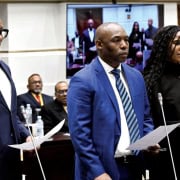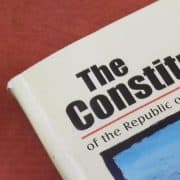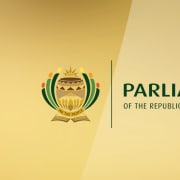|
Getting your Trinity Audio player ready...
|
Corruption Watch has made a submission to the Judicial Commission of Inquiry into Allegations of State Capture, known as the Zondo commission. Our submission focused on the appointment of leadership positions to key corruption and crime fighting institutions, such as the Auditor-General and the Independent Police Investigative Directorate. In the opinion piece below, project coordinator Sabeehah Motala explains more about what CW’s submission entailed.
By Sabeehah Motala
Despite the current focus of the world on Covid-19, the government must still run our country and parliamentary processes must continue. As such, our civilian oversight duties are ongoing, and perhaps more challenged than ever, as a state of disaster limits our physical access to Parliament and its players. In particular, key appointments are happening during this time – the executive director of the Independent Police Investigative Directive (IPID) and the auditor-general.
Appointments to leadership positions of institutions that have an anti-corruption function deserve public scrutiny, as institutions can only be as effective as their leader allows.
In May 2020, the Portfolio Committee on Police finally instructed the minister of police to fill the position of IPID executive director, which has been held by an acting leader for longer than the year stipulated in the IPID Act. Is this contravention of the law a strategic omission or the result of distraction by the global pandemic? While police violence is currently in the spotlight, it is imperative that South Africa’s police oversight body is as strong and independent as possible.
The problem with IPID is not limited to the minister’s failure to employ a permanent head. The IPID Act itself is vague in who exactly should be appointed, citing that a ‘suitably qualified person’ should be selected through a process identified by the minister, and approved by Parliament. This is problematic because it falls to the minister alone to select those who are supposed to have oversight over the institutions he leads. Arguably, this is too much a concentration of power in the hands of one person.
This is one of the points that Corruption Watch has made in a submission to the Judicial Commission of Inquiry into Allegations of State Capture, known as the Zondo commission. We focus on the appointment of leadership positions to key corruption and crime fighting institutions. Our submission is the result of interventions undertaken since 2016 in creating public awareness and calling for transparency and public participation in the selection proceedings of heads of Chapter 9 institutions and other organisations in the criminal justice system. It also highlights Parliament’s role in the appointment of leadership positions to key oversight institutions, and how this capacity should be strengthened to prevent compromised individuals leading organisations that are meant to protect and defend our democracy,
Corruption Watch has made several recommendations in terms of reforming appointment processes, starting with an audit and review of relevant legislation. Legislation should provide strong direction on appointment processes, including criteria for candidates and guidance on ensuring transparency and accountability.
Secondly, power to appoint should be diffused to prevent the possibility of unilateral decision-making or interference from political interests. Ideally, an appointment panel that includes a variety of experts and stakeholders should be developed, modelled on Judicial Services Commission appointments, as well as the recent processes to appoint the SARS commissioner and the national director of public prosecutions. Such a model does not remove Parliament’s powers in making an appointment. Rather, it enriches the process by improving objectivity, independence and expertise.
Thirdly, in addition to criminal and financial vetting, there must be rigorous standard testing for ethics and integrity, skills, and expertise for all candidates, using merit-based and objective criteria. Proper screening would prevent the shortlisting of dubious candidates, and would reduce the likelihood of appointing a scandal-prone leader.
Finally, we recommend that public participation and transparency are fundamental principles integrated into appointment processes. The public is the biggest stakeholder in any corruption-fighting, democracy-building institution and has an interest in who leads them. The public should be informed of requirements for positions, who has applied, and how they will be appointed. They should be given opportunities to comment, where appropriate. This transparency will inspire trust in parliamentary processes, and allow room for accountability.
Corruption Watch will also be engaging this year with the Ad-Hoc Committee on the Appointment of the Auditor-General, to advocate for the inclusion of these principles. The committee is mandated to recommend a candidate for the position towards the end of August.
Strong, ethical leadership is a key component of effective corruption-fighting, especially necessary in South Africa where corruption has become the culture and bribery is part of the daily grind. An ethical leader leads by example, inspires satisfaction, builds a perception of effectiveness, and creates an environment conducive to reporting and accountability.
Where there is ethical leadership, there is a greater will to implement anti-corruption tools and policies, producing a culture of integrity. Many leadership appointment processes must be scrutinised and rethought to incorporate anti-corruption principles and practices, if we want our institutions to be clean, trustworthy and proactive in defeating corruption.








